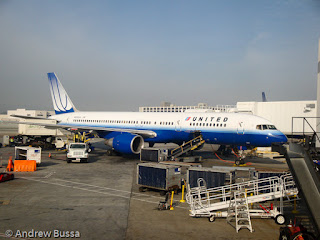Airline Award Price Inflation
Inflation is a great way for governments to take wealth and
reduce their debt. It happens continuously, but no one really notices, so it's
a low risk political move. By creating
more currency, the government receives the full value of the new money while everyone's
existing money is worth slightly less.
It's something everyone endures, but no one enjoys.
 |
| South American Style Currency |
Recent Inflation Victim
Airlines also manage a currency and create inflation.
Airlines created their own currency with points programs and have been adding
more currency than is being redeemed.
This creates an over supply of currency against a static (more or less)
supply of awards. The unbalanced supply
and demand creates an opportunity for point inflation. Airlines manage their
currency like Venezuela or Argentina.
There is constant inflation by creating more currency with fixed award opportunities. They also engage in large and sudden
devaluations periodically. Venezuela has
inflation every day, but they will also suddenly change exchange rates. Both destroy currency value, but the gradual
devaluation stings less. Airlines do the
same when they change their award charts (British Airways most recently).
Awards that cost 80,000 miles yesterday can cost 100,000 points today
when the award chart changes over. These
massive changes are usually, but not always, announced several months in
advance.
 |
| More Miles Pursuing Same Seats |
Hyper Inflation Airlines
Airlines create new currency, point or miles, at no cost to
them. They sell this currency to
partners, like credit cards or hotels and receive real money for their proprietary
money. United Airlines sold $2.9 billion of frequent
flyer miles in 2013 and has about $4.9 billion of frequent flyer miles
outstanding. They expect 20% these miles
to expire, so the mileage expiration policy creates $1 billion in profit. They did not disclose how they value a frequent flyer mile.
“Five million and 4.7 million MileagePlus flight awards were
used on United in 2013 and 2012, respectively. These awards represented 7.7%
and 7.1% of United’s total revenue passenger miles in 2013 and 2012,
respectively. Total miles redeemed for flights on United in 2013, including
class-of-service upgrades, represented approximately 80% of the total miles
redeemed.” (UAL annual report) 20% of mileage
redeemed was used for partner flights, merchandise awards, and other ground
based awards. That’s a massive amount of
miles chasing relatively few awards and creates a great inflation opportunity.
 |
| Costs More and More To Sit Up Front |
44% Inflation over 9 Years
When I started collecting United miles in earnest, a round
trip to Europe in business class was 80,000 miles. Then it became 100,000. Now it's 115,000 on United or 140,000 on a
partner. 1,000,000 United miles was
worth 12.5 round trips, but is now worth 7 trips. This is a massive currency devaluation of 44%
over 9 years. Frequent flyers should be
marching and banging pots in front of United's corporate office, but I doubt
many realize their miles are worth so much less. Most customers measure their balance by the number
of miles in it. This is a poor indicator
of value though. Viewing it as the number of awards you want (business class tickets to Europe in my example) is a
better indicator of value.
 |
| Program Changes Can Reduce Award Balance Value |
Reducing Inflation Risk
Collecting miles and points creates an inflation risk. The more you collect, the larger the
risk. Inflation can't be eliminated, but
the risk can be managed. Here are a few
tactics to help support an inflation hedge strategy:
- Collect Points in Multiple Programs – All programs have inflation, but at different rates and different times. Diversification reduces your exposure to a single program's risk. It also creates more reward opportunities.
- Spend Points Regularly - A smaller point balance lowers the potential loss of value to inflation. Also, why bother collecting miles if they are never used?
- Be Aware of Pending Award Price Changes - Don't be taken by surprise, read emails from your programs. If a change is coming, book at the lower prices if able. I booked a round trip to Europe before British Airways changed their award chart this year.
- Change Programs if Required - Most airlines have partners and one partner may have a more rewarding and stable award structure. Alaska miles seem more stable than Delta miles and you can earn either on a Delta flight.
- Set Award Based Goals - Don't set a balance number as a goal. 1,000,000 United miles has a nice ring to it, but it isn't an end in itself. 4 round trips to Europe in business class is a better goal because it has a fixed value while the miles could change value. Redeem when you reach your goals.
- Create A Single View of Your Assets – Take a look at your award balances on one screen. Copy and paste into Excel or Gmail if needed. Looking at your assets on the same page will help you understand where your risks are. It also may help you be more creative with your awards. 80,000 Delta miles and 62,500 American miles is a round trip to Australia in business class.








